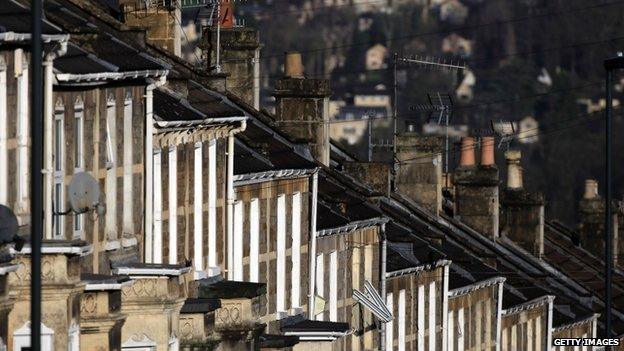Budget 2014: Welfare spending cap set at £119.5bn in 2015-16
- Published

The welfare cap is expected to include spending on housing benefit
UK spending on welfare is to be capped at £119.5bn for 2015-2016, Chancellor George Osborne has announced.
The basic state pension and some unemployment benefits will be excluded from the cap.
The limit on total welfare spending will be set by the chancellor at the beginning of each parliament.
If the limit is breached, the chancellor will have to explain why, and a vote would be held in Parliament.
"Britain should always be proud of having a welfare system that helps those most in need," Mr Osborne said.
"But never again should we allow its costs to spiral out of control and its incentives to become so distorted that it pays not to work."
Pension credits, severe disablement allowance, incapacity benefits, child benefit, maternity and paternity pay and universal credit will all be within the scope of the cap.
Housing benefit, apart from the benefit linked to Jobseeker's Allowance, will also be capped.
The cap will include spending on the Employment and Support allowance, but not spending on Jobseeker's Allowance.
The £119.5bn cap is forecast to rise in line with inflation to £126.7bn in 2018-19.
"In future, any government that wants to spend more on benefits will have to be honest with the public about the costs, need the approval of Parliament, and will be held to account by this permanent cap on welfare," Mr Osborne added.
Labour has already said it will introduce a three-year cap on welfare spending if elected in 2015.
In 2015, the government is expected to spend £113.1bn, external on welfare payments, rising to £117.9bn in 2016.
Capping spending creates a framework for future governments to make decisions about spending priorities, said centre-right think tank Policy Exchange.
"With the government having set this cap broadly in line with their current spending plans and with state pensions excluded, it is unlikely to get pressure for additional future cuts, but it will at least be effective at helping to curb the likelihood of substantial increases in spending in the future," said Ruth Porter, head of economic and social policy at Policy Exchange.
The cap commits the government to not overshoot estimates for welfare spending over the coming years, said the Institute for Public Policy Research (IPPR), a centre-left think tank.
"As the coalition have divided opinions on social security cuts, with Liberal Democrats signalling their unwillingness to sign them off, the cap has no policy effect for now, but does set up a political battleground around spending at the election," said Graeme Cooke, research director at the IPPR.